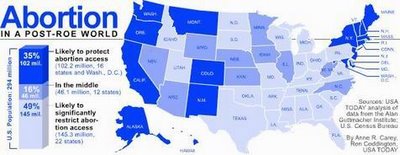
USA TODAY used the Guttmacher data and other factors to calculate how states would be likely to respond if Roe were reversed. The 1973 decision recognized access to abortion as part of a constitutional right to privacy and limited states' ability to restrict it.
The conclusions:
•Twenty-two state legislatures are likely to impose significant new restrictions on abortion. They include nearly every state in the South and a swath of big states across the industrial Rust Belt, from Pennsylvania to Ohio and Michigan. These states have enacted most of the abortion restrictions now allowed.
Nine states are considering bans similar to the one passed in South Dakota — it's scheduled to go into effect July 1 — and four states are debating restrictions that would be triggered if the Supreme Court overturned Roe.
•Sixteen state legislatures are likely to continue current access to abortion. They include every state on the West Coast and almost every state in the Northeast. A half-dozen already have passed laws that specifically protect abortion rights. Most of the states in this group have enacted fewer than half of the abortion restrictions now available to states.
•Twelve states fall into a middle ground between those two categories. About half are in the Midwest, the rest scattered from Arizona to Rhode Island.
The result, according to this analysis, would be less a patchwork of laws than broad regional divisions that generally reinforce the nation's political split. All but three of the states likely to significantly restrict abortions voted for President Bush in 2004. All but four of the states likely to maintain access to abortion voted for Democrat John Kerry.
The 22 states likely to enact new restrictions include 50% of the U.S. population and accounted for 37% of the abortions performed in 2000, the latest year for which complete data were available.
The 16 states likely to protect access to abortion include 35% of the U.S. population and accounted for 48% of the abortions performed.
Other factors to weigh
There are some factors that this analysis doesn't take into account.
Among the states ranked as likely to enact new restrictions, Michigan and Wisconsin now have governors who support abortion rights and presumably would veto a ban if they were still in office. Courts in Florida and Tennessee have ruled that their state constitutions protect abortion rights, limiting the impact of Roe's reversal.
(That's not necessarily an insurmountable hurdle, though: Florida voters amended the state constitution in 2004 to allow a law requiring minors seeking abortions to notify their parents, and Tennessee activists are pursuing a constitutional amendment to limit abortion rights there.)
The states ranked as likely to continue current access to abortion could be pre-empted if Congress passed laws that restricted or criminalized abortion nationwide. And first things first: Reversing Roe may be a more distant prospect than activists in both camps think. It would require a change of heart or retirement by at least one of the five current Supreme Court justices who have endorsed it.
Read the whole thing
Reproductive Rights Feminism Abortion Pro Choice SJR 127 Tennessee